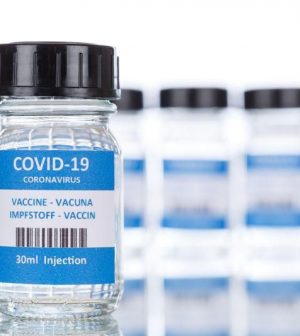- The Long-Term Effects of Daily Turmeric Supplements on Liver Health
- Could Your Grocery Store Meat Be Causing Recurring UTIs?
- Are You Making This Expensive Thermostat Error This Winter?
- Recognizing the Signs of Hypothyroidism
- 10 Strategies to Overcome Insomnia
- Could Artificial Sweeteners Be Aging the Brain Faster?
- Techniques for Soothing Your Nervous System
- Does the Water in Your House Smell Funny? Here’s Why
- Can a Daily Dose of Apple Cider Vinegar Actually Aid Weight Loss?
- 6 Health Beverages That Can Actually Spike Your Blood Sugar
Pfizer’s New Booster Shot Shows Protection Against Emerging Omicron Variants

Pfizer’s updated COVID booster shots are proving their mettle against emerging omicron variants, the company announced Friday.
The latest version of the vaccine generated virus-fighting antibodies against four more omicron lineages, including the troubling BQ.1.1 variant.
Notably, the immune response wasn’t as strong against these newer variants as it is against the BA.5 strain. But adults 55 and older experienced a nearly ninefold jump in antibodies against BQ.1.1 a month after receiving the updated booster, according to a new preprint study. That’s compared to a twofold rise in people who got another dose of the original vaccine.
The preliminary data hasn’t yet been vetted by independent experts, but Moderna also recently announced early evidence that its updated booster generated antibodies against BQ.1.1.
It’s too soon to know how much real-world protection such antibody boosts translate into, or how long it will last. Antibodies are only one type of immune defense, and they naturally wane with time.
After dominating the country for months, the BA.5 variant is now responsible for only 30% of new cases, according to the U.S. Centers for Disease Control and Prevention. The BQ.1.1. variant now accounts for 24% of cases, up from 2% in early October, while its close cousin BQ.1 accounts for 20% of cases.
“Any kind of boost really reduces your chances of getting very sick from COVID,” Dr. Kathryn Stephenson, of Beth Israel Deaconess Medical Center in Boston, told the Associated Press earlier this week.
Updated boosters are available for anyone 5 or older, but only about 35 million Americans have gotten one so far, according to the CDC. Nearly 30% of seniors are up-to-date with the newest booster, but only about 13% of all adults are.
More information
Visit the U.S. Food and Drug Administration for more on the updated COVID booster shots.
SOURCE: Associated Press
Source: HealthDay
Copyright © 2026 HealthDay. All rights reserved.










